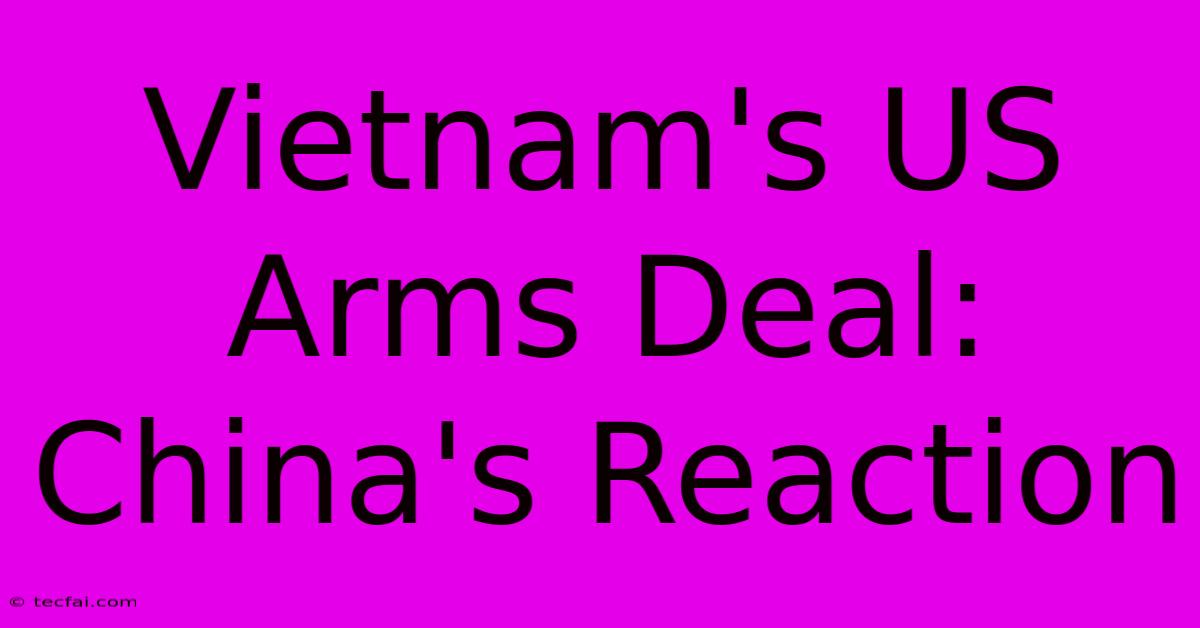Vietnam's US Arms Deal: China's Reaction

Discover more detailed and exciting information on our website. Click the link below to start your adventure: Visit Best Website tecfai.com. Don't miss out!
Table of Contents
Vietnam's US Arms Deal: China's Reaction and the Shifting Geopolitical Landscape
Vietnam's recent acquisition of advanced US military equipment has sent ripples throughout the region, prompting a notable reaction from China and reshaping the complex geopolitical dynamics of Southeast Asia. This arms deal, while significant for Vietnam's defense modernization, represents a deeper strategic shift in the balance of power in the South China Sea and beyond.
Understanding the Deal's Significance
The specifics of the arms deal remain partially undisclosed, shrouded in the usual secrecy surrounding such agreements. However, reports indicate that Vietnam has procured a range of sophisticated weaponry, potentially including coastal defense systems, surveillance technology, and other equipment crucial for bolstering its naval capabilities. This is not a new development; Vietnam has a long history of acquiring arms from various sources, but the scale and nature of this particular deal with the US represent a significant escalation. This isn't just about acquiring weapons; it’s about signaling a strategic partnership and a commitment to countering perceived threats.
For Vietnam, the deal offers several key advantages. It strengthens its defense capabilities against potential aggression, particularly in the disputed waters of the South China Sea. It also diversifies its sources of military equipment, reducing dependence on any single supplier and enhancing its strategic autonomy. Furthermore, it represents a deepening of its strategic relationship with the United States, a powerful counterbalance to China's growing influence in the region.
China's Measured Response: A Tightrope Walk
China's official response to the arms deal has been relatively measured, avoiding overtly aggressive rhetoric. However, underlying the official statements is a clear undercurrent of displeasure. Beijing views the deal as a direct challenge to its regional ambitions and a potential destabilizing factor in the South China Sea. China’s concerns stem from the enhanced capability it grants Vietnam to contest China's claims in the disputed waters.
China's response has largely been focused on diplomatic channels. While official statements have emphasized the importance of regional peace and stability, there have also been subtle warnings about the potential consequences of escalating tensions. This measured response can be interpreted as a strategic calculation; an overtly hostile reaction could potentially alienate other nations in the region and strengthen Vietnam's resolve. China is walking a tightrope, attempting to manage the situation without triggering a full-blown confrontation.
Geopolitical Implications: A Shifting Regional Order
The Vietnam-US arms deal is more than just a bilateral agreement; it's a significant marker in the ongoing geopolitical struggle for influence in the Indo-Pacific. The deal underscores the growing convergence of interests between Vietnam and the US, built upon shared concerns about China’s assertive actions in the South China Sea and its increasingly powerful military.
This development has broader implications for the regional security architecture. It could potentially lead to a further strengthening of alliances and partnerships within the region, potentially involving other countries wary of China's influence. It also highlights the increasing complexity of regional dynamics, with countries navigating a delicate balance between economic ties with China and strategic partnerships with other major powers.
The Road Ahead: Uncertainty and Potential for Escalation
The long-term implications of this arms deal are still unfolding. While the immediate response from China has been relatively restrained, the potential for future escalation remains. The South China Sea continues to be a flashpoint of potential conflict, and any further strengthening of Vietnam's military capabilities could increase the risk of incidents or miscalculations.
The situation requires careful diplomatic management by all involved parties. Open communication channels and a commitment to peaceful resolution of disputes are crucial to prevent the situation from spiraling into open conflict. The future of the region hinges on a delicate balancing act between competing interests and the need for regional stability. The Vietnam-US arms deal serves as a stark reminder of the evolving geopolitical landscape and the challenges ahead.

Thank you for visiting our website wich cover about Vietnam's US Arms Deal: China's Reaction. We hope the information provided has been useful to you. Feel free to contact us if you have any questions or need further assistance. See you next time and dont miss to bookmark.
Featured Posts
-
Dubai Lindsay Lohans Routine
Nov 29, 2024
-
Live Stream Uae Vs Bahrain T20 Match
Nov 29, 2024
-
Kretinskys Uk Gas Plants Energy Crisis Boom
Nov 29, 2024
-
United Edges Bodo Glimt 3 2 Nov 28
Nov 29, 2024
-
Ariana Madix Macys Day Parade
Nov 29, 2024
